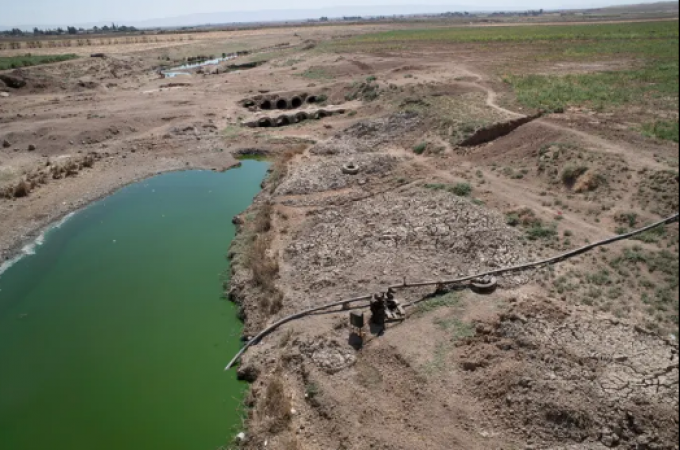
Damascus: Fishermen claim their catch has decreased significantly in the area surrounding Syria's largest freshwater dam reservoir as a result of environmental pressures decimating aquatic life.
Ismail Hilal, 50, talked about the way of life he has lost as he sat on the hull of his rowboat, which is now firmly anchored on the shores of Lake Assad.
He has given up fishing after 37 years of doing it, admitting defeat as fish populations have plummeted, water levels have dropped, and pollution in the Euphrates and the dam reservoir it feeds has gotten worse.
Also Read: Leaked Texts Unleash Racist Storm: Finnish Minister Embroiled in Controversy
Father of seven Hilal claimed, "I have lived my entire life on the water. "However, I had to stop this year. I could no longer support myself by fishing.
Syria has been embroiled in civil war for more than ten years, and the nearby town of Raqqa served as the epicentre of the brutal "caliphate" of the Daesh organisation until their defeat in 2017.
The battered nation, where 500,000 people lost their lives in the conflict, has also been affected by climate change, from scorching summer heat to protracted drought.
Also Read: Spanish Government to Evacuate Over 70 Citizens from Niger Amid Escalating Security Threat
Upstream dams in Turkiye have also affected the flow of the Euphrates, one of the region's mighty streams and the site of the world's earliest civilizations.
The sharp decline in fish stocks was attributed by other fishermen AFP spoke to to low water levels in the river, a lack of precipitation, worsening pollution, and overfishing.
According to Hilal, fishermen now "barely take in five percent" of their historic catch.
Instead of fishing anymore, he now works in a restaurant in Tabqa, on the eastern shore of the lake, toiling in front of a scorching hot oven and preparing and grilling fish.
The Euphrates flows nearly 2,800 kilometres (1,700 miles) through Turkiye, Syria, and Iraq before emptying into the sea. It is believed to have fed the biblical Garden of Eden.
From the Turkish border, it flows southeast through Syria, irrigating the country's agricultural heartland and filling the reservoirs of three hydroelectric dams, which supply millions of people with both drinking water and electricity.
The largest reservoir, Lake Assad, covers an area of 600 square kilometres (230 square miles).
However, according to the Dutch peace organisation PAX, its water level has decreased by four metres (12 feet) since last year. The group attributes this to a "downward spiral of drought and water shortages."
According to the group's Wim Zwijnenburg, the lack of water and pollution are "driving further biodiversity loss along the lakes and rivers" in Syria's north and east.
Also Read: Burning Anger Sparks Border Tightening: Sweden's Response to Qur'an Incidents
According to the UN Food and Agriculture Organisation, Raqqa Province only received 208 mm of rain per month last year.
Large plumes of algae were visible to an AFP team at Lake Assad, which experts say is a sign of pollution because it depletes the water's oxygen content and kills aquatic life.
Except for a few fragments of the seagrass that now ensnares some shallow areas, the long, green nets used by Ali Shebli, 37, a fisherman like his father, were empty when he pulled them in. 50 kilogrammes of fish could be consumed daily in the past, he claimed. "But because of the low water level and the pollution, we now hardly get one or two kilogrammes, and sometimes nothing."
Shebli, who struggles to provide for his wife, three children, and sick father, described the family's situation as "disastrous" due to the declining fish stocks. The local economy as a whole has suffered from the crisis.
In a market in the nearby town of Raqqa, which is now controlled by the Kurdish-led Syrian Democratic Forces after the IS was driven out, fish are displayed on blocks of ice.
But as he scaled fresh fish on a bench, fishmonger Ragheb Ismail, 45, noted that the current selection of seafood is a far cry from the days when there were "tonnes of fish" available for purchase.
Because of the drought, the scarcity of water, and the high temperatures, he claimed that even the largest fishmonger could only offer 200 kilogrammes of fish at any given time.
There are a lot of customers these days, he lamented, but "not enough fish."